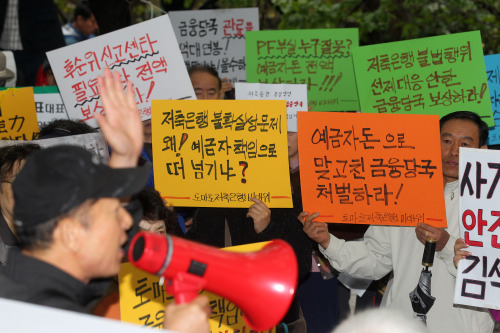 |
(Yonhap News) |
Costs incurred due to embezzlement, fraud by employees triple over 4 years
The cost of embezzlement and fraud by employees at South Korean financial firms has more than tripled in four years, according to the country’s top financial regulator.
The Financial Supervisory Service said malpractice by employees at banks and other financial firms reached 274 billion won ($240 million) in 2010, sharply rising from 87.4 billion won in 2006.
The irregularities were discovered and punished across the sector with local banks, securities, insurance companies and non-banking firms involved.
The latest finding came after the FSS piled pressure on banks and other financial firms to reform after they issued large dividends to shareholders and exorbitant salaries to their top executives.
The criticism is primarily directed at banks and financial companies that received public funds to stay afloat and are reaping huge profits by increasing commissions and interest fees charged on ordinary customers while keeping the lending rate almost unchanged.
The number of recorded malpractices at banks rose from 48 in 2009 to 57 in 2010, up 19 percent over the cited period, but the total amount of losses caused more than tripled to 169.2 billion won, the FSS said.
The number of employees sacked for embezzlement, fraud and other irregular acts reaches about 100 per year. The problem is that the sums involved in malpractice cases are increasing.
Between 2006 and 2010, banks suffered the most, with losses caused by fraud and other malpractice running to 357.9 billion won, followed by non-banking firms (192 billion won), brokerages (89.6 billion won) and insurance companies (26.4 billion won).
More than half of the dismissals related to malpractice came from credit card companies and savings banks. Dismissal or a salary cut are the most severe penalties brought upon an employee for misconduct.
The country’s regulators are pushing to reform salary and dividend practices that offer easy profits to some executives at banks and other financial companies.
Between 2006 and 2010, the country’s top four financial holding companies ― Shinhan, Woori, KB, Hana ― paid out 3.8 trillion won in dividends, which is 17.5 percent of their combined net profit during the period. The ratio is far higher than in other industries, which prompted public outcry.
Compensation packages at major financial firms have also surpassed other sectors at a time when the broader economy is mired in slower growth, higher inflation and a bleak global outlook.
Credit card companies recently announced they would lower the commission charged at small restaurants in a reluctant response to the regulator’s call, but banks and other financial firms continue to defend their large paychecks and dividends.
By Yang Sung-jin (
insight@heraldcorp.com)




![[Herald Interview] 'Trump will use tariffs as first line of defense for American manufacturing'](http://res.heraldm.com/phpwas/restmb_idxmake.php?idx=644&simg=/content/image/2024/11/26/20241126050017_0.jpg)

![[Health and care] Getting cancer young: Why cancer isn’t just an older person’s battle](http://res.heraldm.com/phpwas/restmb_idxmake.php?idx=644&simg=/content/image/2024/11/26/20241126050043_0.jpg)

